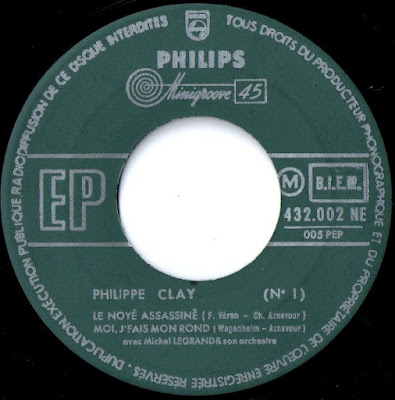Philippe Clay (March 7, 1927 – December 13, 2007) was a French mime artist, singer and actor. Perhaps because he was not so much of a caricature Frenchman as his boyhood hero Maurice Chevalier, he did not amass major mainstream interest in the English-speaking world. Yet he was a French star who enjoyed standing-room only seasons at France's premier music hall, the Paris Olympia, for an act that embraced mime and comic monologues as well as interpretations of songs written by the likes of Charles Aznavour, Leo Ferre, Boris Vian and Serge Gainsbourg.
The eldest child of a cultured family, he was born Philippe Mathevet in Paris, left school at 16 and joined the resistance for what remained of the second world war. After France was liberated in 1944, he enrolled at the National Conservatory of Dramatic Art. Though he specialised in mime, his powerful baritone was sufficiently impressive for fellow students to enter him in a singing competition, which he won in 1947. As Philippe Clay he was booked into the Théâtre des Trois Baudets in Montmartre.
The cabaret venue attracted an audience looking for diversion less polished than the Moulin Rouge, and it was common for artistes to be roundly booed if they did not provide it. Dressed informally in turtleneck pullover and slacks, Clay rose to the challenge, winning cheers and ovations with a mix of old favourites and entries in the newly established disc and sheet music sales charts. Soon, he was cramming up to six 20-minute slots into Parisian clubs a night, often in split shifts with Aznavour, who became a close friend.
Another struggling chansonnier, Jacques Brel, opened for Clay when he undertook a national tour in the summer of 1953. This was followed by the simultaneous releases of a debut single - Aznavour's Le Noye Assassine - and an eponymous album.
Top-20 successes during the next four years warranted Clay's maiden headlining performance at the Olympia in 1957 and returning three more times up to 1962. Later hits included such disparate selections as a translation of Hello Dolly (1964) and Mes Universités, Clay's own lyrical riposte to the student upheavals in France during 1968.
He was able to pick and choose material submitted by up-and-coming composers such as Gainsbourg, whose mordant Les Poinçonneur des Lilas was incorporated into Clay's stage repertoire. Further items were requested, and Clay offered to record an album of Gainsbourg tracks as long as his magnanimity was acknowledged by a share in the songwriting royalties.
He made the first of more than 80 films in 1951 with a tiny part in Le Crime du Bouif. With his imposing height and strikingly angular face, he made much more of a mark as the acrobatic Valentin in Jean Renoir's French Cancan (1954), dramatically thin but praised for its visual effects.
Among other notable supporting roles were Clopin Troillefou, King of Thieves in Notre Dame de Paris (1956), titled The Hunchback of Notre Dame when dubbed for English-language distribution; Mr Barton in the Oscar-nominated horror vehicle, Shanks (1974), and, that same year, the voice of Richelieu in a cartoon version of The Three Musketeers. He made a final screen appearance in the TV mini series La Commune in 2007.
Clay also appeared regularly in plays, soap operas and situation comedies on French radio and television, and ventured into operetta via Lehar's The Merry Widow, and classical theatre, mainly in productions of Shakespeare, Ibsen and Molière. The last of these was in 2006.
Philippe Clay died of a heart attack on December 13, 2007 in Issy-les-Moulineaux, Hauts-de-Seine, France.. He was survived by his wife, actress Maria Riquelme, and their son.
(Edited mainly from Guardian obit by Alan Clayson)








2 comments:
I managed to find this 50 track mp3 album which should satisfy you French music lovers. Alas no recording dates given.So for “Philippe Clay - Vintage Selection (2021 Vintage Jukebox)” go here:
https://mega.nz/file/AzRW2bRS#KPeWgZtjH9gfsPaApnS61-TL4aGHGqRDTR7qYE5jlzA
1. Le noyé assassiné 2:01
2. Moi, j'ai mon rond 2:45
3. Si j'avais un piano 1:47
4. A perpète 3:29
5. Le danseur de charleston 3:29
6. Cigarettes, whisky et p'tites pépées 3:16
7. La chanson de Clopin 2:22
8. Julie la rousse 2:15
9. La gambille 2:31
10. Il y avait une ville 2:45
11. L'homme de l'équateur 2:26
12. Fais ta prière (Tom Dooley) 2:50
13. La dolce vita 2:48
14. La sentinelle 2:39
15. La vie de patachon 3:27
16. Les touristes 2:40
17. Le fils du comique troupier 3:58
18. Si je savais chanter 3:03
19. Les années 2:52
20. Les fesses d'Irma 2:23
21. Chanson pour tézique 2:05
22. Je suis sous… 0:4
23. L'illusioniste 2:49
24. La goualante du pauvre Jean 2:12
25. Le funambule 3:05
26. Pour un air 2:01
27. Le chemineau 3:03
28. Le corsaire 2:40
29. La gamberge 2:30
30. Joseph, ma canne 3:49
31. Un fil sous les pattes 3:26
32. Festival d'Aubervilliers 2:11
33. La grasse matinée 3:17
34. Qu'est ce que j'en ai à foutre ? 2:10
35. Les voyous 3:20
36. Où sont les pépées ? 2:52
37. Je n'peux pas m'empêcher 2:53
38. Juste le temps de vivre 1:33
39. On n'est pas là pour se faire engueuler 3:42
40. Bleu, blanc, rouge 2:47
41. Manger porteur 3:32
42. Les camions 3:16
43. Lily taches de rousseur 2:03
44. Vous et tu 2:50
45. Au volant de ma valse 2:20
46. Qui c'st-y ? 1:57
47. Qui vous a dit madame ? 3:01
48. C'est un 78 tours 3:48
49. Mucho-mucho 3:24
50. Hello Dolly 2:36
Oui Oui !
Post a Comment